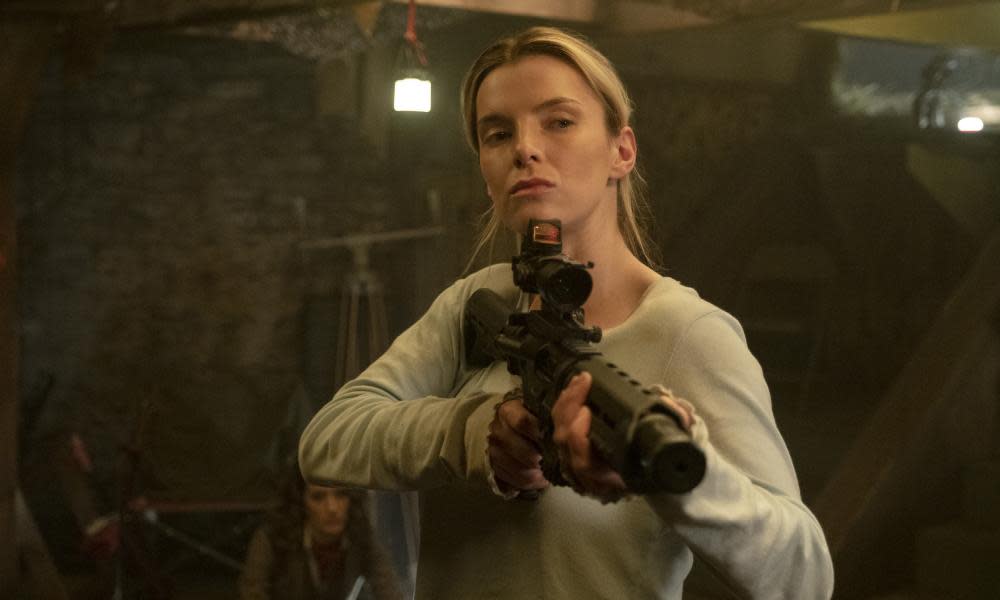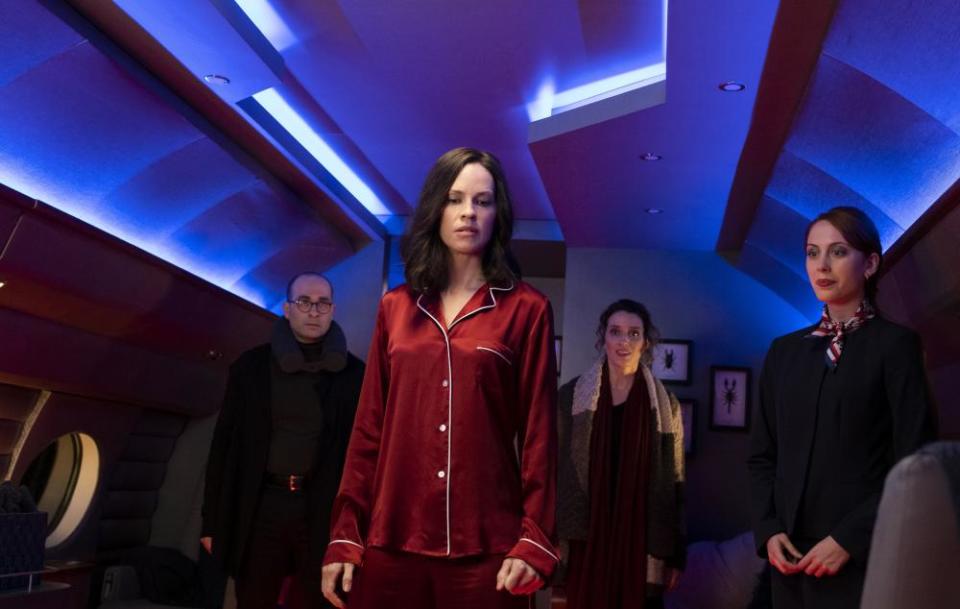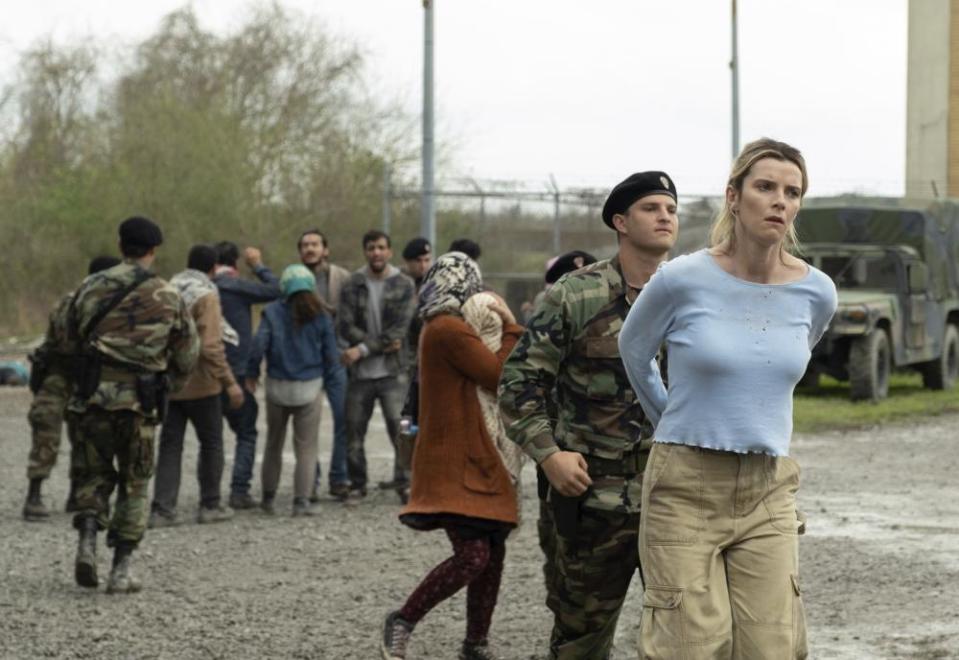'It's a fun movie, I promise': behind the elites v 'deplorables' thriller The Hunt

“I certainly didn’t make the movie to try and gin up controversy,” said Craig Zobel, director of the most controversial movie of not only this year but last year as well, a potato so hot that it was briefly deemed untouchable. The Hunt, a schlocky thriller that also happens to be a broad satire on political extremism in the US, was originally scheduled for release last September, but after the Dayton and El Paso shootings the month before, it faced an uncertain future.
Related: The Hunt review – gory Trump-baiting satire is more hype than horror
The plot imagines a Hunger Games-style playground where liberal elites hunt “deplorables”, AKA Trump voters, in a variety of gruesome ways. Initially, the film’s marketing campaign were paused out of respect (even a satirical use of such heavy artillery was not deemed appropriate at the time) but matters worsened when details about the film’s red state v blue state setup started to disseminate and rightwing anger travelled all the way from Fox News to the White House. Trump didn’t name the movie specifically but in a tweet on 9 August, he called Hollywood “racist”, “really terrible” and said some of the films being released are “very dangerous for this country”. On 10 August, The Hunt was taken off the schedule.
For a time, there were questions over whether we would ever get to see The Hunt, at least on a big screen, with rumours that Universal might consider selling it to an online streamer. But with a tweaked marketing campaign, one that now revels in its toxic infamy, it re-emerged earlier this year and now, finally, it’s being unleashed on the public.
“It’s been a long road,” Zobel said to me on the phone from Los Angeles, sounding understandably wearied. “You make a movie hoping that people get to see it and now people finally do and I think I’m just excited to hear people’s responses.”
The Hunt began with Lost co-creator Damon Lindelof and his Leftovers co-writer Nick Cuse crafting a devilish way to update Richard Connell’s 1924 short story The Most Dangerous Game, centred on a brutal human hunt, for an increasingly fractured America. Zobel, whose big-screen credits had included grim fact-based fast-food drama Compliance and post-apocalyptic saga Z for Zachariah, had also directed a number of episodes of The Leftovers and was immediately drawn to the idea.
He had just moved from the liberal safe haven of New York City to Athens, a smaller city in Georgia, a state that voted for Trump in 2016. “I realised I was making assumptions about these people that lived around me,” he said. It led him to crave something that would both explore and poke fun at the ideas that we have of those on the opposing side so it was kismet when the script came his way. “We found out that we had all been individually thinking about this stuff and that it was the perfect time for us to tell this story,” he said.
For a while, the stars seemed to align. Blumhouse, the hit-making company behind Get Out and Paranormal Activity, jumped onboard, as did Universal and a cast including two-time Oscar winner Hilary Swank, Glow breakout Betty Gilpin and Ryan Murphy. Emma Roberts quickly signed on. But then things went sour and a Friday night B-movie suddenly became the subject of noxious debate, referred to as “demented”, “evil” and “dangerous”. Before anyone had even seen it.

“It felt bizarre because the film was supposed to be an absurd satire and was not supposed to be serious and boring and I felt that the conversation immediately got serious and boring,” Zobel said. “I was just the person, over in the corner, maintaining ‘It’s a fun movie, I promise! I just want people to see it!’ because it’s a film that’s essentially about the assumptions you make about something without really knowing anything about it.”
Making an assumption about something without really knowing anything about it has become a signature move for the US president although nothing could have prepared Zobel for the surreal moment of seeing your film tweet-dragged by one of the most powerful men in the world.
“I was in the very last days of sound mixing the movie,” Zobel recalled. “I got a text from Ike Barinholtz, one of the actors [in The Hunt], who said I think that the president of the United States just tweeted about our movie. I had to go looking for what he was talking about and pretty quickly just ended up standing outside the soundstage for the rest of the day trying to process and kind of parse what was going on and it was unique. The day that the president tweets something about you or a movie that you made is just a very weird day, it really is.”
The ire aimed at Zobel, death threats included, was predicated on the idea that the film was somehow celebrating the leftists who take bloody revenge on rednecks but, if anything, it works hard at doing the opposite. Zobel sees it as a “fun refuge” rather than an angry dissection of where we are right now. The difficult journey it’s had to reach an audience has found its happy ending with a wide release but it also serves as a warning of how easily film-makers can get silenced in a culture keen to cancel.

“It isn’t a healthy world, one where everyone is trying to decide whether or not they should make something based on how it’ll be received politically,” Zobel said. “I certainly wouldn’t advocate for that and I don’t think like that, even after this. “I believe that people who have things to say will continue to really have things to say.”
We spoke a week before the reviews came out, which were mixed at best (the Guardian’s Adrian Horton called it “a boilerplate B-movie that doesn’t say nearly as much as it thinks it does”), telling a cautionary tale of the dangers of hype. The film that Zobel saw as “playful and fun” had mutated into something with far more to carry on its shoulders. Ultimately, what The Hunt works best as is an action thriller which I told him would please at least one potential audience member, notorious for skipping past dialogue to watch the explosions.
“I think the president might like the movie,” Zobel agreed. “I’m proud of the action scenes in the movie. If he wants to just watch the action scenes, I’m fine with that!”
The Hunt is out now

